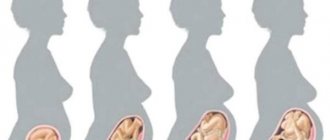The first signs of pregnancy after conception
- 10 How to determine the time of conception?
Our great-grandmothers tried to find out whether conception occurred long before the delay of menstruation, listening to their body or trusting folk signs. Ultra-precise medical diagnosis of pregnancy arose closer to the beginning of 1960, when, based on the experimental findings of the German scientist Dr. Sondek, the first test was created to determine the amount of hCG in a woman’s urine. Therefore, until 1960, in gynecological offices, women were told about what the first signs of pregnancy after conception might be, warning that in some cases the expected symptoms indicate diseases of the reproductive system.
Painful sensations in the lower abdomen as a sign of pregnancy
Many women experience discomfort in the lower abdomen immediately after conception. These sensations may be somewhat reminiscent of the pain observed before the onset of the next menstruation. Typically, the cramps described by the vast majority of pregnant women when they remember the beginning of their pregnancy are not associated with the growth of the uterus. This is the body's natural reaction to the successful completion of conception. However, if the pain lasts more than 2 weeks and menstruation does not occur, there is a high probability of an ectopic pregnancy. In this case, it is necessary to consult a gynecologist who will perform a transvaginal ultrasound to exclude the threat of spontaneous abortion or abnormal position of the fertilized egg.
Digestive system dysfunction and pregnancy
Most often, the first signs of pregnancy after conception are associated with the woman’s digestive system. They should be taken seriously if conception occurred no more than a week ago before the appearance of the following symptoms:
- flatulence accompanied by heaviness in the stomach;
- heartburn;
- aversion to certain foods and smells;
- the desire to change your diet or add dishes with unexpected flavor combinations to it.
You can feel when conception has occurred only when the egg fertilized by sperm penetrates the wall of the uterus. Until this moment, the woman’s hormonal background remains the same, so it is not possible to find out the exact date of pregnancy based on observations of the functioning of the digestive system.
Psychological aspect of pregnancy
Women actively planning a pregnancy specifically calculate favorable days for conception and therefore are in a tense psychological state. They try to explain the frequent changes in their mood with the onset of a long-awaited pregnancy. There is some truth in this: pregnant women really are in a difficult psychological state. Thanks to changes in hormonal levels, you can feel that fertilization has taken place. The woman becomes very emotional. She experiences self-pity, the cause of which may be panic fear for her child or the irreversibility of future childbirth (this condition is due to the fact that the pregnant woman is afraid of the very process of childbirth).
Soreness of the mammary glands: mastopathy or pregnancy?
Sure signs of pregnancy after conception are associated with changes in the mammary glands. About 90% of women in labor felt discomfort in the breast area immediately after possible conception. The mammary glands enlarge long before the first day of missed menstruation (about 1.5 - 2 weeks). The chest becomes rounder. You may notice how the areolas and nipples become wider, acquiring a rich brown tint. Thus, the breast begins to prepare for future feeding of the baby.
Cystitis as a signal of pregnancy
The smallest stage of pregnancy is very often accompanied by cystitis. The cause of inflammation of the bladder may be associated not only with changes that have occurred in the uterus (which at first resembles a chicken egg), but also with the restructuring of the entire body. The woman's immune system is weakened. Therefore, until the day of delivery, she may experience problems with urination, which may be caused by infections. However, now cystitis is treated with safe antibiotics, which can be used even when the period is less than 7 weeks.
Increase in basal temperature
Women who want to know when favorable days for conception will arrive regularly measure their basal body temperature. This method is practiced by those for whom the date of birth is especially important. After all, some mothers strive to give birth to a child on a certain significant date: New Year, wedding anniversary or other important event. It is believed that a sharp increase in temperature indicates ovulation. If the temperature rises in the days following ovulation, then conception has occurred. But if conception has taken place and the temperature does not rise, a woman can be diagnosed with a lack of progesterone, which often causes miscarriages.
Colds as a possible symptom of pregnancy
In the first days after conception, you may feel weakness, general malaise, and increased body temperature. This condition is often accompanied by all the symptoms of acute respiratory infections: runny nose, cough, sore throat. This is how the body reacts to the changes that have occurred to it. Therefore, some women talk about the possible date of birth, counting the day of conception from the day of the cold, if the date coincides with a subsequent delay in menstruation. This condition is justified in the case when you can remember the approximate date of the onset of the cold.
Diagnosis by detecting hCG in a woman’s blood and urine
Long before giving birth, a woman’s body produces a hormone – human chorionic gonadotropin. This hormone is produced within days of conception by the future placenta. This means you can find out about the approximate date of pregnancy long before the first days of missed menstruation have passed. It is enough to determine the presence of hCG in the body (this can be done in three ways: buy a pregnancy test, do a special blood or urine test). The most reliable result can be obtained if the period from the beginning of fertilization is 10 days. Some women, considering favorable days, do a hCG test immediately when their basal temperature rises, but such results can be questioned since the concentration of the hormone initially does not exceed what is permissible in the body of non-pregnant women.
Why do you need to know about the first signs of pregnancy?
Not all women calculate the days of ovulation because they use contraceptives or do not have a regular sexual partner. Therefore, for them, the days of delay of the next menstruation come as a surprise. Not all pregnancy tests can show reliable results. There have been cases when a woman found out that she had an impressive pregnancy period shortly before... giving birth. Of course, it is difficult not to notice the movements of a child in the womb, but, as history shows, it is possible. This means it is necessary to know about the first symptoms of a possible pregnancy in order to help the doctor determine what the preliminary date of birth is. This is especially important for those women who have an irregular menstrual cycle and, therefore, the days of ovulation in each month may vary.
How to determine the time of conception?
The possible period of conception is considered to be from the first day of the last menstruation. In the same way, the possible date of birth is determined in order to prevent cases of post-term pregnancy or to determine the degree of prematurity in the case of premature birth. The date of conception is calculated in two ways:
- Add 40 weeks or 280 days to the date of the first day of the last menstruation (after calculating the period for ovulation - 2 weeks).
- From the first day of the last menstruation, 3 months are counted and a week is added to the resulting date.
By determining the time of conception, a woman can protect herself and her baby. After all, many medications, cosmetic procedures, and functional diagnostic methods are unacceptable during the period from the beginning of pregnancy to the birth itself. In addition, every woman must know her gestational age in order to have time to decide what she will do next. If the expectant mother works in a hazardous workplace, she will have to quit so as not to endanger the life of her baby. In addition, she will be able to understand the cause of her illness and dramatic changes in mood, which will make life easier not only for her, but also for the people around her.
Additional material
Traditional methods
You can determine pregnancy at home without using a test. This is where folk methods that are passed down from generation to generation come to the rescue. Of course, they do not have the same accuracy as pharmacy tests, but, as practice shows, they are often effective. These methods are based on the reaction of the elements that make up urine with various substances that are added to urine during the study.
Boiling morning urine
Our great-grandmothers determined conception using such a simple and quick method as boiling morning urine. If during this procedure whitish flakes appeared in the urine, it was assumed that there would soon be a new addition to the family.
In this case, it was necessary to take into account the fact that the woman should not have any diseases of the urinary system. Otherwise, the diagnosis was considered false.
Use of red wine
To confirm the interesting situation, the test subject's urine was mixed in equal quantities with red wine. If after mixing the color of the wine remained the same, it was considered that pregnancy had occurred.
To carry out diagnostics, it is necessary to use natural homemade wine without any impurities.
Potassium permangantsovka
With the help of potassium permanganate, you can confirm or refute conception. To do this, you will need a weak solution of potassium permanganate and the urine of the subject. You need to add a little urine to a weak solution of potassium permanganate.
If the mixture then acquires a lighter and yellowish tint, fertilization most likely has not occurred. If white flakes appear in the liquid and the pink tint remains, it can be assumed that the mother and father are waiting for replenishment.
Soda
Determination of the onset of conception is carried out using regular baking soda. This home diagnostic method is based on changes in the acid-base environment in the female body during pregnancy. The research is carried out as follows:
- It is necessary to collect a small amount of urine in a clean, dry container. It is better to do this in the morning, immediately after sleep.
- Add half a teaspoon of soda to the urine and watch the reaction.
- If there is a hissing sound, it means that conception has not occurred. If the soda precipitates at the bottom of the container with urine, this means that the woman will soon become a mother.
Regular baking soda is suitable for this procedure.
We should also not forget that if a girl has various diseases that can affect the pH level in the body, this method is irrelevant. The experiment can be seen in the photo.
With the help of brilliant green
In a similar way, you can diagnose conception using brilliant green. To do this, drop a drop of brilliant green into the urine and watch the reaction. If the drop fell down, fertilization did not occur. But, if the drop stays on the surface, the probability of motherhood is high.
Iodine
Determining pregnancy using iodine is another common method. As in the previous case, you must first collect the urine in a clean container. To carry out diagnostics, you can use the most common iodine from the pharmacy. You need to drop a drop of this product into a jar of urine and observe the reaction.
If a drop of iodine lingers on the surface of the urine for a few seconds and does not spread across the surface, it is highly likely that the woman will soon become a mother. If the iodine spread over the surface into small grains and dissolved, conception most likely did not occur.
You might be interested in: Gynecological diseases
Fortune telling with a bow
Our grandmothers believed in such a diagnostic method as planting onions. A girl who suspects her interesting situation needs to take two approximately identical onions, wish for a positive and negative result on them, and then put them in water. It was believed which of the bulbs would grow faster to a height of 4-5 cm, and this was the result. There is no doubt that this method, from a scientific point of view, has no basis. The procedure is more likely a kind of entertainment for the girl, rather than a reliable method for determining conception.
With flowers
Most folk methods are based on observations of our ancestors. Previously, it was believed that pregnancy could be diagnosed by watering flowers with a woman’s morning urine. Since it contains an increased amount of hormones, the flowers acquired a more lively appearance during watering. You can evaluate the result of the test within 3-4 days. If the condition of the plants did not change much, most likely fertilization did not occur.
Dreams
Our grandmothers and great-grandmothers have long noticed that dreams are often associated with reality. In the old days, it was believed that when a girl became pregnant, she dreamed of fish or swimming in a pond. In this case, it doesn’t matter at all what kind of fish you dream about and what the woman does with it.
Today, these signs are rarely confirmed in practice. In addition, the fact of self-hypnosis plays an important role. Girls who have been planning a child for a long time may often see fish in their dreams due to self-hypnosis.
By pulse in the lower abdomen
Due to the fact that while carrying a baby, representatives of the fair sex have an additional circle of blood circulation during pregnancy, many mothers note that the pulse rate increases in the abdominal area. To feel the pulse in this area, you need to place your fingers a few centimeters below the navel. If a woman notices increased pulsation, perhaps the husband and wife will soon wait for replenishment.
Expert opinion
Ksenia Dunaeva
User experience expert and comment moderator. Higher medical education and more than 5 years of actual practice.
Ask Ksenia
None of the above folk methods provides a complete guarantee. Despite this, home diagnostics also have their advantages. They are completely safe for health and can be quickly used without leaving home. Folk remedies can help determine singleton, multiple, biochemical pregnancy, and conception during menopause. In other words, all conditions in which hormone levels will increase.
Feel pregnant from the very first days
moderators:
(even before the expected menstruation) has anyone succeeded? and also, please post a link, if you have one, where you can look at the BT results - how to determine ovulation, etc. Thank you
(even before the expected menstruation) has anyone succeeded? and also - please post a link, if you have one, where you can look at the BT results - how to determine ovulation and... quoteresponse
I felt the second pregnancy the next day after conception. I just told my husband that we were going to have a baby. He didn’t believe it until my stomach started to ache))) and I myself didn’t believe it for a long time - it was very easy to take it, my stomach started to grow late…. .quoteanswer
I have a week before my month. temperature rose to 37.3 (body not BT) quoteanswer
I felt both the first and the second. The first time I went to the doctor I said: I’m pregnant. And he told me: How long is the delay? - No, I still say - Go, he says, and don’t come for three months, you’ll still have time to run tests. — With the second one, I sent it the same way. quoteanswer1150882732
After conception (9 days ago) I was simply sure that I would be pregnant. And I couldn’t wait to find out, as a result, yesterday I went and had an HCG test and according to the tests there was no berth, and I also measured the pace. 36.8. which cannot happen with ber-ti. So I advised the girls to go for hCG and either already know and be happy, or not to tune in and worry uselessly. It was hard to just drop from heaven to earth, because it seemed to me that I was nauseous, and my chest began to swell and I wanted to sleep. In short, I bow to all the experienced women who want to do it and am amazed at how they endure it all. God bless all the kids.
Is it possible to feel conception?
There are cases in medicine where a woman, seven months pregnant, was heartily surprised when doctors told her such “stunning” news. Some people listen to changes in the body that occur from the first day of pregnancy, others do not hear signals coming from outside - it all depends on the woman’s degree of sensitivity. Is it possible to feel conception immediately after intercourse? Gynecologists give an unambiguous answer to this question, believing that it is impossible to catch the movements of the egg, its division and growth during the first two weeks. They are sure that only a test can show pregnancy in the early stages; the woman will invent everything else, attribute it to her imagination and use mysticism.
The first signs of egg fertilization
When planning a child, every day after ovulation seems long-awaited to us, because it is during this period that pregnancy can occur. If the sperm has entered the internal environment, where it unites with the egg, and they move together through the fallopian tube, this does not mean that pregnancy has occurred. This process is called conception, and it cannot be heard or felt, since division occurs at the cellular level. 23 pairs of chromosomes are formed, they divide, increase in growth, move towards the uterus, and only after 7 days they reach their intended destination. Think for yourself, how many times is a cell smaller than the whole organism? If there are any changes, they can only be seen under a microscope.
First signs of pregnancy
Physiologically, you can feel the moment of pregnancy; this occurs 7-9 days after sexual intercourse. If inside a woman feels a small click or a slight tugging in the lower abdomen, it means that the implantation process has occurred, i.e. attachment of the egg to the wall of the uterus. From this moment on, there is no longer a fertilized cell, but an embryo that will grow and develop. In 20% of cases, it happens that the sperm that merged with the egg reached its “destination”, but for some reason the embryo did not attach to the uterine wall. It is premature to talk about pregnancy here. By the way, if you take a test immediately after sexual intercourse or a day later, it may show two pale pink stripes. Don’t rush to conclusions just yet, because the test signals changes in the woman’s body, which means that fertilization has occurred, but the embryo has not yet begun to develop.
Doctors believe that a woman begins to feel pregnant only with the appearance of the embryo. The body reacts immediately: early toxicosis begins, you suddenly want to sleep, you feel weak throughout the body, frequent mood swings, the regularity of urination is disrupted and the breasts increase in size, becoming leaden.
Imaginary pregnancy
Depending on the type of nervous system, a woman may be more sensitive to events in her life, especially if they concern her personal life, family, or pregnancy. To feel fertilization means to mentally wish it for yourself (nothing more). If you listen to every slight signal, then you can find many signs of conception among the usual symptoms of ill health: a pulled stomach, enlarged breasts, no cervical mucus after ovulation... These and other signs can be interpreted in two ways: an aching stomach as a sign of PMS or indigestion, the mammary glands have become more is a side effect of a cold; there is no discharge after ovulation, which means it is delayed for several days. Those who constantly listen to such symptoms are classified as perpetually pregnant or “almost pregnant.”
White crows, or how often they unexpectedly become mothers
Weight gain, soreness and swelling of the breasts, morning sickness, fatigue, moodiness, lack of menstruation, a baby moving and pushing against internal organs... The list of pregnancy symptoms is long, documented and studied by science, “tested” in practice by millions of mothers. It is therefore surprising that there are cases where women did not know that they were pregnant until labor began. Against the backdrop of such stories, the questions that some representatives of the fair sex ask about whether it is possible not to notice pregnancy, for example, at 2 or 5 months, will seem naive.
Last year, the Internet made waves with the story of 22-year-old Australian Kate Hudson, who traveled around the world and only realized at 38 weeks that she was in an interesting position. There is also the story of an American woman, Shelby Magnani, who gave birth to twins without knowing she was pregnant. This seems incredible, doesn't it?
It turns out that such stories of unnoticed pregnancy are not so unusual and are not something completely out of the ordinary. According to statistics, on average, one in 450 women does not know that they are pregnant until the 20th week, and one in 2,500 does not know this until the very birth! For comparison, the probability of having triplets is three times less and is 1 in 6889 pregnancies. But you must admit that we all periodically hear reports of the birth of triplets and do not consider them an extraordinary event.
The first days of pregnancy: feelings and actions of the expectant mother
May 30, 20140136155 Category: Pregnancy
Those women who plan to become mothers take their feelings in the first days of pregnancy with great responsibility. Observing their body, they strive to see any signs of the birth of a new life.
Experts note that there are two stages of your pregnancy: obstetric term (counted from the first day of menstruation) and true term (counted from the day of conception). In most cases, it is very difficult to determine the exact day of conception, which is why antenatal clinics consider the first day of menstruation as the starting point. Today we will talk about the first signs of pregnancy according to the true term.
The first days of pregnancy after conception: what happens in the body
Turning to science, we note that the first week after conception cannot yet be called pregnancy. The fact is that a fertilized egg moves within 7-10 days to the place where it will be located and develop from an embryo into a fetus. Only after its attachment to the walls of the uterus can we talk about pregnancy. Menstruation occurs if this attachment does not occur, and then the woman does not even suspect that conception has occurred.
If the fertilized egg reaches the uterus, then it is implanted into the walls of the uterus (embryo implantation). After successful implantation, the umbilical cord and placenta begin to form. The first week after conception is very important in the period of conceiving a new life, since the woman’s body perceives the embryo as a foreign body and tries in every possible way to reject it, not allowing it to consolidate properly.
After successful implantation of the embryo, the first thing that happens in the body is hormonal changes . A woman begins to produce a special hormone that is responsible for the safety of the fetus in the female body in the early stages of pregnancy: known as hCG. The presence of this hormone in the blood gives a 100% guarantee of pregnancy. Most doctors and women trust a blood test for hCG more than pregnancy tests in the early days, although the latter also react to the presence of the hormone. Read more about hCG during pregnancy >
The first days of pregnancy: how to recognize
For a healthy woman, the first sign of pregnancy is always a delay. But, if you do not monitor your general condition and do not plan your pregnancy, then the delay is determined when the pregnancy has already lasted 2-3 weeks. Several signs may indicate that in the first days after conception the embryo is implanted into the walls of the uterus.
1. Minor bleeding. On days 7-12 after conception, when the embryo implants into the walls of the uterus, a woman may experience slight bleeding (implantation bleeding). It may appear as several brownish or yellowish spots on underwear or paper. If pregnancy is not planned, then this phenomenon is often perceived as the beginning of menstruation. If such spots appear when pregnancy has already been accurately diagnosed, then this may be a signal of a threat of miscarriage, and requires urgent consultation with a doctor. This sign may be absent in the first days of pregnancy, it all depends on the individuality of the body.
2. Increase in body temperature and basal temperature. When planning pregnancy, the method of measuring basal temperature is often used to determine the date of ovulation. When the egg is successfully fertilized, this temperature first drops and then rises. Low basal temperature in the first days of pregnancy is caused by two factors:
- When pregnancy occurs, estrogen is released, which lowers the temperature;
- Progesterone begins to be produced more strongly again, which increases the temperature.
Thus, by monitoring your basal temperature, when pregnancy is already confirmed, you can see a “hole” on the graph with a decrease in temperature. This decline lasts only 1 day, then the temperature rises. The norm is a basal temperature of 37 degrees, until the placenta begins to fully function (the first few weeks). If you do not notice a decline, then it is impossible not to notice an increased temperature for 2-3 weeks.
3. Feeling slightly unwell . A woman’s well-being may worsen in the first days of pregnancy. Drowsiness and weakness often appear. Many even become slightly ill, complaining of a sore throat and runny nose. This is all due to a decrease in immunity and the body’s struggle with the implanting embryo.
In the first trimester, body temperature is always elevated, but only slightly. Hence the general weakness. The main condition for the normal course of pregnancy with such ailment is not to be treated with medications that can harm the unborn child. When planning a pregnancy, it is generally better to refuse all medications unless they are absolutely necessary, and resort exclusively to folk remedies that are not contraindicated during pregnancy.
There is a feeling of apathy and fatigue. This is due not only to the general restructuring of the body, but also to the increased production of progesterone. These sensations may stop quickly, or may drag on until the 10th week of pregnancy, when more estrogen begins to be produced.
4. Breast sensitivity . In the first days of pregnancy, a woman’s breasts begin to swell, pain appears, that is, its sensitivity increases. Even the slightest touch can be painful.
Sometimes everything happens completely opposite. Previously, a woman experienced painful sensations before each period, but now she is surprised that her breasts do not hurt. Soon after an amazing moment, she learns that she is pregnant. Often, when pressing on the areola, colostrum can be released in early pregnancy.
5. Heaviness in the pelvic area . The manifestation of the first days of pregnancy may be a feeling of heaviness in the pelvic organs. Many women begin to feel the uterus immediately after embryo implantation. The degree of this sensation is individual for each organism.
6. Tingling in the uterus . Also, an individual pregnancy rate can indicate not only successful conception and implantation.
7. Early toxicosis , accompanied by nausea and vomiting, along with others, is a sign of the first days of pregnancy. Toxicosis is also considered a special sensitivity to certain odors and foods. There may be a feeling of disgust for previously favorite foods.
In the early days of pregnancy, you may come to love things you previously hated. Also, the early stages are characterized by strange food combinations: herring with compote, ram with chocolate, pineapple with sausage. Those around them grimace at the sight of such food, and the pregnant woman experiences indescribable bliss.
The first days of pregnancy: false symptoms
Some of the above symptoms may indicate more than just pregnancy. They may indicate intestinal diseases, cervical erosion and other diseases of the female genital organs. Such symptoms include bleeding, nausea, increased urination, and breast swelling can also indicate not only the onset of pregnancy.
The first days of pregnancy: what to do
Any method of determining pregnancy begins to work only with the onset of a missed period. Even knowing the exact day of ovulation, no analysis or test will indicate pregnancy the day after fertilization. An hCG test, a pregnancy test, and an ultrasound examination of the pelvic organs are best done in the first week of missed menstruation.
When planning a pregnancy and anticipating its occurrence, you should completely change your lifestyle six months before conception. If the first symptoms of pregnancy are present, but they do not cause you any particular discomfort, then wait for the delay and the opportunity to do a test. A visit to the gynecologist in the first week after conception will not give any result other than a stack of referrals for tests.
During this period, you can read something useful and pleasant about pregnancy, inquire about upcoming courses for expectant mothers, take care of your body and start doing gymnastics for pregnant women (even if you are not pregnant, physical exercise will never hurt).
Just spend this time with joy and pleasant impressions. Talk to the future dad about a possible miracle. You should go to the doctor after a positive pregnancy test, a 2-week delay in menstruation, or if you have gynecological problems. Read more about what to do if you are convinced that you are pregnant >
If the symptoms manifest themselves very intensely and the malaise intensifies, then the visit to the doctor should be postponed to an earlier date. This is especially true for those who have previously had problems conceiving or carrying a pregnancy.
The first trimester of pregnancy is the most important. At this time, all the vital organs of the baby are formed. The very first days of pregnancy play a huge role in the onset of pregnancy in general.
If you did not plan your pregnancy, then try to predict it (by having unprotected sexual intercourse) and not harm the baby. If pregnancy is planned, then behave as before: maintain proper nutrition, avoid heavy physical activity and do not be nervous, then a miracle will definitely happen.










